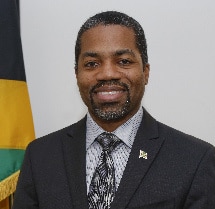Jamaicans will be involved in Island’s “Vision 2030”
KINGSTON, Jamaica – (JIS) – Executive Director of the Planning Institute of Jamaica (PIOJ), Dr. Wesley Hughes, has said that the development of the plan, which will put Jamaica on a path to achieve developed country status by 2030, will have the full participation of Jamaicans from various sections of the society.
Speaking at the launch of Vision 2030, the long-term strategic National Development Plan, on Wednesday (Oct. 31) at the Jamaica Conference Centre, Dr. Hughes said that the plan will reflect the aspirations of Jamaicans about their long-term future and only stands a chance of being successful based on this people-centred principle.
“When we examine the history of Jamaica since Independence, we cannot discern any single national goal or strategy that unites the country across administrations, and which acts as a catalyst for development. That is why, from the beginning, we have seen this plan as a partnership and have sought to make the process of drafting and reviewing the plans as inclusive as possible. We want every Jamaican to know about this plan and be familiar with what it seeks to achieve because it will directly affect us all,” he stated.
Mr. Hughes said he wanted Jamaicans in their different capacities throughout the country, to provide consensus on the way forward for the country as it embarks on the preparation of the 25-year National Development Plan. “We want Jamaicans to be aware of what is taking place and how this national initiative filters down to them at the community and individual levels,” he stated.
He informed that to date, 30 task force teams, each comprising of experts in the respective fields, and charged with the development of sector strategic plans, “are working on various sector plans,” and have produced 26 preliminary drafts so far.
The plan is being developed with broad-based support across every strata of the society. The PIOJ, in its role as the main planning agency in Jamaica, is leading and facilitating this collaborative process, incorporating the support from private sector groups, civil society and the Diaspora. A Plan Advisory Group (PAG) consisting of industry leaders, academia, as well as leaders from various sectors, will support the work of the PIOJ.
“But more difficult work lies ahead, involving wider consultation, making strategic decisions about priorities, integrating the sector plans into a cohesive and internally consistent document with implementation and action plans, along with timelines and even budgets for the first few years,” he informed.
Preparation of the draft plan started in January 2007 and will continue until March 2008. It will be tabled in the House of Parliament in April 2008, following which there will be further island-wide consultations, prior to finalization.
Over the 15-month period, the PIOJ has planned a series of public consultations called the ‘PIOJ’s Dialogue for Development Series’. These will be organized at strategic locations, and will engage participants from the community, youth groups, public and private sector, non governmental organizations (NGOs) and other special interest groups. These will take the form of town hall meetings and discussions as part of the PIOJ’s Dialogue for Development Series.
The launch was attended by representatives from the state, private sectors, students, media, church, the non-governmental organization (NGO) community and members of the diplomatic corps.
The plan was officially launched by Prime Minister Bruce Golding.


